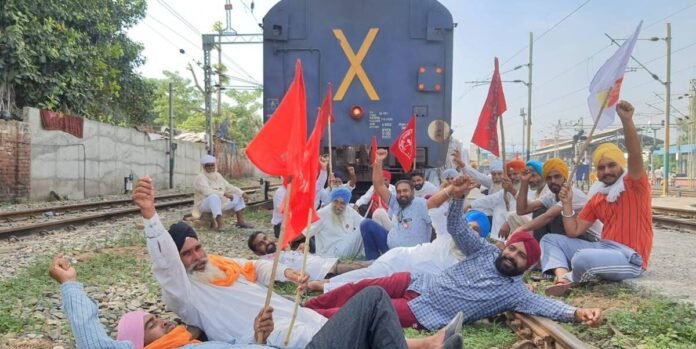In a significant escalation of their ongoing agitation against the contentious farm laws, protesting farmers in Punjab have resorted to a “Rail Roko” campaign, leading to disruptions in train services across the state. The move, aimed at intensifying pressure on the government to repeal the agricultural reforms, has resulted in widespread inconvenience for passengers and logistical challenges for freight transportation. As tensions mount and negotiations stall, the standoff between farmers and the authorities underscores the deep-seated grievances and the urgent need for resolution.
The farmers’ protest, which has been ongoing for over a year, represents one of the largest and most sustained movements in recent Indian history. Spearheaded primarily by farmers from Punjab, Haryana, and Uttar Pradesh, the agitation gained momentum following the passage of three contentious agricultural laws by the central government in September 2020. The laws aimed to liberalize agricultural markets, allowing farmers to sell their produce directly to private buyers and bypass traditional wholesale markets regulated by the government. However, farmers expressed concerns that the reforms would undermine their bargaining power, weaken the existing support system, and leave them vulnerable to exploitation by large corporations.
The Rail Roko campaign, a common tactic employed by protesting farmers in India, involves blocking railway tracks to disrupt train services as a means of drawing attention to their demands. In Punjab, which serves as a major transit route for freight and passenger trains, the impact of such disruptions is felt acutely. With key railway junctions and tracks blocked by demonstrators, the movement of trains carrying essential commodities, industrial goods, and passengers has been severely hampered. This disruption not only inconveniences travelers but also poses challenges for industries reliant on timely transportation of goods.
Despite repeated appeals from authorities and railway officials to lift the blockade, the farmers remain steadfast in their demands for the repeal of the farm laws. Efforts to negotiate a resolution have been marred by deadlock, with both sides unwilling to cede ground on their respective positions. While the government has offered to amend certain provisions of the laws and provide assurances regarding minimum support prices (MSP) for certain crops, farmers maintain that nothing short of a complete repeal will suffice. Amidst this impasse, the Rail Roko protests serve as a potent symbol of the farmers’ resolve and determination to continue their struggle until their demands are met.
The Rail Roko campaign not only disrupts transportation networks but also underscores the broader socio-political implications of the farmers’ agitation. Beyond its immediate impact on train services, the protest reflects the deep-seated discontent and disenchantment among agricultural communities grappling with myriad challenges, including mounting debt, declining incomes, and agrarian distress. For many farmers, the protest represents a fight not just for their livelihoods but also for the preservation of India’s agrarian identity and the protection of small-scale agriculture from the forces of corporatization and globalization.
As the Rail Roko protests enter their nth day, calls for dialogue and reconciliation grow louder from various quarters. Civil society organizations, political leaders, and activists have urged both the government and farmers to resume negotiations in good faith and work towards a mutually acceptable resolution. The protracted nature of the standoff has already taken a toll on the economy, with disruptions in transportation leading to delays in the movement of goods and impacting industries reliant on seamless supply chains. Moreover, the prolonged impasse threatens to exacerbate social tensions and deepen divisions within society, underscoring the urgency of finding a peaceful and equitable solution to the crisis.
In addition, the Rail Roko protests in Punjab serve as a potent reminder of the challenges facing India’s agricultural sector and the imperative of addressing the grievances of farmers. As the standoff between farmers and the government continues, it is essential for all stakeholders to engage in meaningful dialogue and negotiate in good faith to reach a resolution that addresses the concerns of farmers while ensuring the long-term sustainability and viability of Indian agriculture. Only through constructive engagement and compromise can a pathway forward be forged towards a more equitable and inclusive agrarian future.

